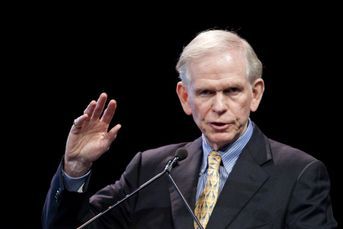U.S. recovery at risk from emerging market woes: El-Erian
Pimco's Mohamed El-Erian says the U.S. economic recovery is facing stiff headwinds from weakening emerging market economies and spiraling currencies. That has big implications for investors.
Weakening emerging-market growth and spiraling currencies risk creating headwinds for a recovering U.S. economy, according to Pacific Investment Management Co.’s Mohamed El-Erian.
“Longer term, we should care due to the feedback loop to the U.S.,” El-Erian, chief executive and co-chief investment officer of the world’s biggest manager of bond funds, said in a radio interview Thursday on “Bloomberg Surveillance” with Tom Keene. “You will see a tightening of financial conditions to markets. You will see growth more challenged and the ability of U.S. companies to get topline growth from emerging markets is going to be less going forward.”
Global stocks, bonds and commodities have been whipsawed since May, when Federal Reserve Chairman Ben S. Bernanke signaled the prospect of cuts to monetary stimulus should the U.S. economy and job market continue to improve. The Fed will probably pare its $85 billion a month in bond purchases at its Sept. 17-18 meeting, according to 65 percent of economists surveyed by Bloomberg Aug. 9-13.
Benchmark equity indexes in China, South Korea, Turkey and Russia are down this year and about $1.4 trillion has been erased from the market value of emerging-market equities since Bernanke said May 22 that policy makers may scale back bond buying. Stocks in Southeast Asia are tumbling at the fastest pace in 12 years relative to global equities, with the MSCI Southeast Asia Index dropping 11 percent this month and 21 percent from this year’s peak on May 8.
Investor Flows
Foreign investors have sold a net $2.2 billion of Thai, Indonesian and Philippine shares this month amid signs of slowing regional economic growth and speculation that the U.S. central bank will soon cut stimulus.
For many emerging nations “capital is reversing, flowing out and putting these countries under tremendous pressure,” El-Erian said from Pimco’s headquarters in Newport Beach, California. “There are certain countries that learned the lessons from the previous crisis and have self-insured tremendously. There are a second set of countries that maintained twin deficits, whose growth dynamics are low and have limited reserves. Turkey is an example of that and there are others.”
Investors need to consider when the Fed will start to pare asset purchases and how they will taper, as well as the global implications, El-Erian said on Aug. 27 in a Bloomberg Television interview. The central bank will probably reduce its Treasury purchases rather than mortgage bonds, he said.
The U.S. economy expanded at a faster pace in the second quarter as a smaller trade deficit and gains in inventories overshadowed the effects of federal budget cutbacks.
Gross domestic product rose at a 2.5 percent annualized rate, up from an initial estimate of 1.7 percent, Commerce Department figures showed today in Washington. The median forecast of 79 economists surveyed by Bloomberg projected a 2.2 percent gain.
(Bloomberg News)
Learn more about reprints and licensing for this article.








